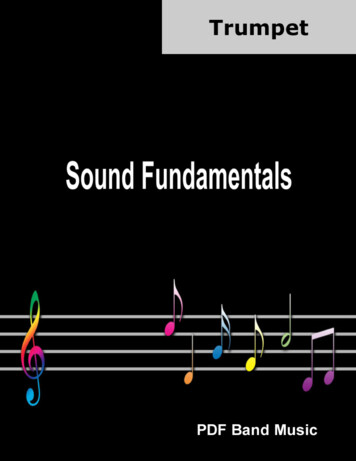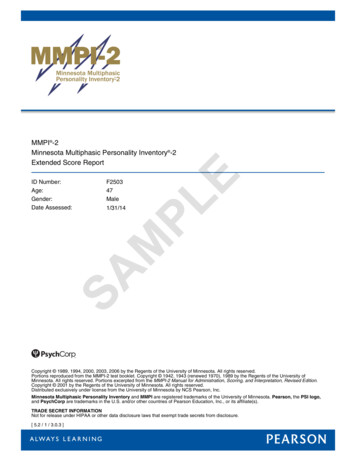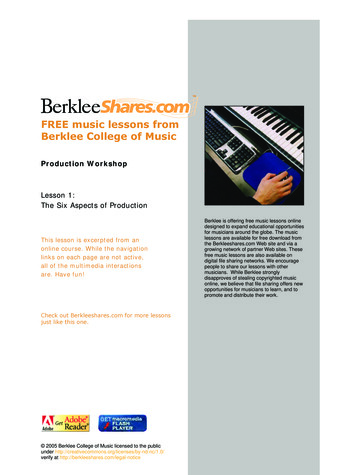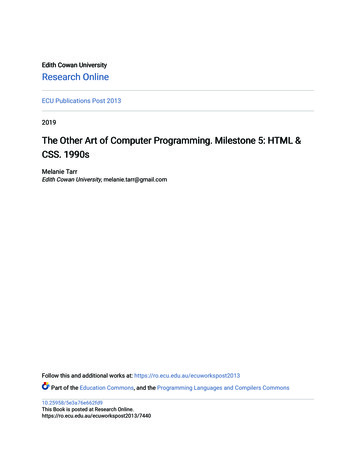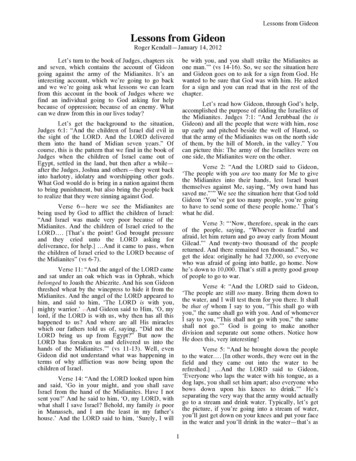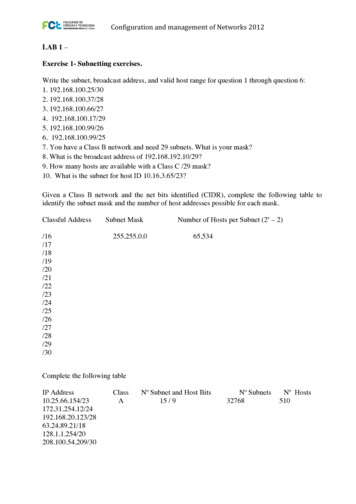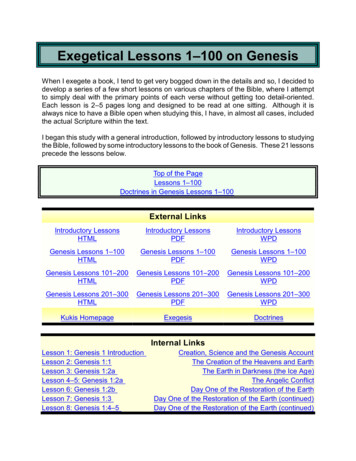
Transcription
Exegetical Lessons 1–100 on GenesisWhen I exegete a book, I tend to get very bogged down in the details and so, I decided todevelop a series of a few short lessons on various chapters of the Bible, where I attemptto simply deal with the primary points of each verse without getting too detail-oriented.Each lesson is 2–5 pages long and designed to be read at one sitting. Although it isalways nice to have a Bible open when studying this, I have, in almost all cases, includedthe actual Scripture within the text.I began this study with a general introduction, followed by introductory lessons to studyingthe Bible, followed by some introductory lessons to the book of Genesis. These 21 lessonsprecede the lessons below.Top of the PageLessons 1–100Doctrines in Genesis Lessons 1–100External LinksIntroductory LessonsHTMLIntroductory LessonsPDFIntroductory LessonsWPDGenesis Lessons 1–100HTMLGenesis Lessons 1–100PDFGenesis Lessons 1–100WPDGenesis Lessons 101–200HTMLGenesis Lessons 101–200PDFGenesis Lessons 101–200WPDGenesis Lessons 201–300HTMLGenesis Lessons 201–300PDFGenesis Lessons 201–300WPDKukis HomepageExegesisDoctrinesInternal LinksLesson 1: Genesis 1 IntroductionLesson 2: Genesis 1:1Lesson 3: Genesis 1:2aLesson 4–5: Genesis 1:2aLesson 6: Genesis 1:2bLesson 7: Genesis 1:3Lesson 8: Genesis 1:4–5Creation, Science and the Genesis AccountThe Creation of the Heavens and EarthThe Earth in Darkness (the Ice Age)The Angelic ConflictDay One of the Restoration of the EarthDay One of the Restoration of the Earth (continued)Day One of the Restoration of the Earth (continued)
Lesson 9: Genesis 1:6–13Days 2–3 of the Restoration of the EarthLesson 10: Genesis 1Evolution, Creationism and Divine DesignLesson 11: Genesis 1:14–18Day 4 of the Restoration of the EarthLesson 12: Genesis 1:14–15Creation Theories and Day 4 continuedLesson 13: Genesis 1:14–19Day 4 of the Restoration of the Earth continuedLesson 14: Genesis 1:20–23A Summary of Creation and Restoration and Day 5Lesson 15: Genesis 1:24–1:27Day 6 of the RestorationLesson 16: Genesis 1:26–1:31Day 6 of the Restoration (continued)Lesson 17: The BibleCreation Throughout the BibleLesson 18: Genesis 2:1–2:3Day 7—the SabbathLesson 19: Genesis 2:4–6Genealogies and Plant LifeLesson 20: Genesis 2:7–9God Makes Adam/God’s NameLesson 21: Genesis 2:8–14The Garden of Eden (Part I)Lesson 22: Genesis 2:15The Garden of Eden (Part II)Lesson 23: Genesis 2:16–17The Garden of Eden (Part III)Lesson 24: Genesis 2:18–25God Makes Adam’s PartnerLesson 25: Genesis 3:1SatanLesson 26: Genesis 3:1–4The Temptation of Eve—Part ILesson 27: Genesis 3:1–6aThe Temptation of Eve—Part IILesson 28: Genesis 3:1–7aThe Fall of ManLesson 29: Genesis 3:4–7Human Good and MoralityLesson 30: Genesis 3:6–7How the Spiritual Impacts a NationLesson 31: Genesis 3:6–11God Comes into the Garden after the Fall of ManLesson 32: Genesis 3:8–11God Speaks to Adam after the FallLesson 33: Genesis 3The Truth of the BibleLesson 34: Genesis 3:6–13Adam and the Woman Offer up ExcusesLesson 35: Genesis 3:14–15God Judges Satan/the Gospel of Jesus ChristLesson 36: Genesis 3:14–15The Seed of the WomanLesson 37: Genesis 3:14–16The Woman’s Desire for Her ManLesson 38: Genesis 3:14–20God Judges Adam, the Woman and SatanLesson 39: Genesis 3:21The Sacrificial Death of Christ for our SinsLesson 40: Genesis 3:22–24Expelled from the GardenLesson 41: Genesis 4:1–5The Offerings of Cain and AbelLesson 42: Genesis 4:1–7Cain’s Human Good and Mental Attitude SinsLesson 43: Genesis 4:1–8 1John 3:12Cain Murders AbelLesson 44: Genesis 4:9–14aGod Punishes CainLesson 45: Genesis 4:9–15God’s Agenda in His Punishment of CainLesson 46: Genesis 4:16–24The Line of CainLesson 47: Genesis 4:25–26The Line of SethLesson 48: Genesis 5:1–2“These are the Generations of.”
Lesson 49: Genesis 5:3–31The Gospel of Jesus Christ Hidden in Adam’s LineLesson 50: Genesis 5:3–32Adam and his DescendantsLesson 51: Genesis 6:1–2Mankind Becomes Corrupted by Angelic BeingsLesson 52: Genesis 6Testimony to the Historical Accuracy of the Old TestamentLesson 53: Genesis 6The Historical Accuracy of the Bible Part IILesson 54: Genesis 6:1–3Mankind Becomes Corrupted by Angelic BeingsLesson 55: Genesis 6:1–3Grace Before JudgmentLesson 56: Genesis 6:1–3Satan’s CounterfeitsLesson 57: Genesis 6:1–5Hebrew Structure and Ancient MythologyLesson 58: Genesis 6:1–5Righteousness, Justice and the Thinking of ManLesson 59: Genesis 6:1–7Civilizations/God Changes His MindLesson 60: Genesis 6:6–9Old Testament SanctificationLesson 61: Genesis 6:6–9Basic Mechanics of the Spiritual LifeLesson 62: Genesis 6:9–14As in the Days of NoahLesson 63: Genesis 6:13–16The Doctrine of the ArkLesson 64: Genesis 6:13–17God Instructs Noah in How to Build the ArkLesson 65: Genesis 6:14–17The Miracles of GodLesson 66: Genesis 6:13–21God’s Covenant with Noah and with usLesson 67: Genesis 6:19–21God’s Instructions and Noah’s CreativityLesson 68: Genesis 6:13–22Personal Faith and ActionLesson 69: Genesis 7:1–5Noah and Company Enter the ArkLesson 70: Genesis 7:6–16Noah, his Family, the Animals and the FloodLesson 71: Genesis 7:6–16The Deluge Begins/The Organization of Genesis 7Lesson 72: Genesis 7:17–20 Genesis 1:3–8The Great DelugeLesson 73: Genesis 7:17–20The Worldwide DelugeLesson 74: Genesis 7:17–24Worldwide Destruction/Lessons from the DelugeLesson 75: Genesis 7The Deluge Compared to Ancient Myths and TraditionsLesson 76: Genesis 8:1–3The Flood Subsides/The Omniscience of GodLesson 77: Genesis 8:4–14The Flood Subsides/The Flood TimelineLesson 78: Genesis 8:15–22Noah and Company Exit the ArkLesson 79: Genesis 8:1a, 22The Cyclical Nature of the EarthLesson 80: Genesis 6–8 and 8:1aThe Organization of Genesis 6–8Lesson 81: Genesis 9:1–7God’s Commandments to Noah and CompanyLesson 82: Genesis 9:8Covenant Theology versus DispensationsLesson 83: Genesis 9:8–11The Noahic CovenantLesson 84: Genesis 9:8–17The Noahic CovenantLesson 85: Genesis 9:18–29The Progeny of NoahLesson 86: Genesis 10:1–5The Founding Nations Descended from JaphethLesson 87: Genesis 10:6–20The Founding Nations Descended from HamLesson 88: Genesis 10:21–32The Founding Nations Descended from Shem
Lesson 89: Genesis 10:1, 32 11:1–2The Movement of Noah’s FamilyLesson 90: Genesis 10:5, 20, 31–32 11:1–4The Tower of BabelLesson 91 Genesis 11:1–4The Tower of BabelLesson 92: Genesis 11:1–9God Confuses the LanguagesLesson 93: Genesis 11Archaeology, Primitive Man and EvolutionLesson 94: Genesis 11Traditional Archaeological ViewsLesson 95:Archaeological Assumptions, C-14 Dating and Ancient TechnologyLesson 96: Genesis 11:10–26The Straight-Line Genealogy of ShemLesson 97: Genesis 11Ancient Biblical TextsLesson 98: Genesis 11:10–26The Line of ShemLesson 99: Genesis 11:27–28Population Growth; Abram’s LineLesson 100: Genesis 11:27–32Abram’s LineDoctrines in Genesis Lessons 1–100Ancient Creation MythsThe Creation Verbs ofGenesisThe Order of CreationWhy Gen. 1:2a isTranslatedBut the earth became awasteland and empty.God and Light andDarknessThe Angelic ConflictGenesis Creation TheoriesHow Light Illustrates theTrinityLight on Day One/the Sunon Day FourThe Doctrine of LightHow Long is a Day?Some of the ArgumentsAgainst EvolutionA New Theory of Creationand RestorationCreation TheoriesThe Sun TheoriesHow the Sun is Analogousto GodWhat is God Teaching theAngels?Summary of Creation andthe Days of RestorationMan, the Shadow Imageof GodThe SabbathTen Amazing Statementsfrom Genesis 1:1–2:7The Pronunciation ofJehovahThe Tree of LifeThe Garden of Eden inScriptureTimelines of the Creationof Man and the WomanWhat God will Make forAdamSatanThe Basis of Satan'sAppealsThe Shifting AuthorityThe Doctrine of HumanGood
The Doctrine of MoralityThe Doctrine of Truth andLiesWhat Does the BibleClaim for Itself?The Historicity of Adam,the Woman and the FallThe Seed of the Womanas Found in the BibleGenesis 3:14–15Genesis 3:14–16Genesis 3:14–19The Doctrine ofAtonementHow We Stand Corruptedand Condemned beforeGodJesus Christ is the OnlyWay to GodCainian ParallelsWhy I Believe that ManHad Tools Early OnWhat Eve's Words Tell UsThe Genealogy of JesusChrist"These are thegenerations of."Adam, Created in theLikeness of GodThe Gospel of JesusChrist in the Genealogy ofAdam to NoahThe Explanation ofJude 1:14–15A More Accurate Chart ofthe Lifespans of Noah'sAncestorsEnoch, Noah and JesusBiblical States of the EarthAmazing Things in Gen.1–6The Testimony of JesusConcerning the OldTestamentWhy the Sons of God inGen. 6 are AngelsSatan's CounterfeitsThe Structure of Gen.6:1–5Bits and Pieces of AncientMythologyDefinition of anAnthropomorphism and anAnthropopathismCivilizationsThe Doctrine ofSanctificationThe Basic Mechanics ofthe Christian LifeThe Parallel of the Days ofNoahThe Organization ofGenesis 6:1–13What the Ark of NoahRepresentsThe Doctrine of Ark in theBibleThe Dimensions of the ArkMiracles in the BibleThe Organization ofGenesis 7The Changing Conditionsof the EarthTheoretical ChangingConditions of the EarthRobert Dean on Why theNoahic Flood wasWorldwideFossil Evidence forMassive AnimalGraveyardsDean's Lessons from theDelugeThe Principal Features ofthe Biblical Record
Similarities betweenGenesis and GilgameshIn both the Genesis andGalgamesh storiesSignificant DifferencesBetween Genesis andEpic of GilgameshThe Omniscience of GodMap of ArmeniaThe Deluge Time FrameThe PriesthoodsAssociating ContinentalDrift, the Tilting of theEarth's Axis and the FloodAxis-Shift AddendumThe Organization ofGenesis 6–8 (from RobertDean)Galatians 2:15–17a as aChiasmosGod Blesses Adam andthe WomanGod Blesses Noah and hisSonsThe [Short] Doctrine ofMurderA Review of DispensationsCovenant TheologyProblems with CovenantTheologyDispensationalism versusCovenant TheologyAdditional Reading onDispensations andCovenant TheologyPoints on CovenantsGod's OmniscienceSummary Points on theNoahic CovenantAdditional References toAntediluvianMeteorological ConditionsWhat is the Purpose of theBible?The Sons of Japheth andtheir AncestorsHamite Descendants byTim OsterholmHam and his Descendants(who Primarily OccupySouthwest Asia andAfrica)The Descendants of Shemwho Occupy the MiddleEastNoah's DescendantsThe Map of Noah's Son'sSonsNoah, His Descendants,and their DistributionA Modern Map of Iraq andIran (which includes thejourney of Noah's Family)The 5 Divine InstitutionsAttacks Against the DivineInstitutionsWhat is the problem withthis tower?Philology from BibleBelievers . OrgTraditional View of theAgesThe Assumptions ofArchaeology andPaleontologyC-14 AccuracyScientific Achievements ofAncient Hamitic PeoplesWhen did the flood occur?
The Biblical Chronology ofGenesis 11Ancient Manuscripts of theBibleThe Meaning of theNames in Abram's LineTransitional Point in theBook of GenesisThe Genealogies of thebook of GenesisA Map of Abraham'sJourneyan exponential decaycurveLesson 1: Genesis 1 IntroductionCreation, Science and the Genesis AccountWe live in an amazing universe. It is so vast that, it is beyond our ability to grasp itshugeness. The sizes of the various stars, the variety of the planets and their atmospheres,are the stuff which grabs the imagination of a young child as well as that of an oldastronomer. One of the few emails which I forwarded, I also posted on my website calledthe Perspective of the Universe. It is just a succession of groups of planets and nearbystars, so that we can get a feel for their relative sizes. Not only is it difficult (if notimpossible) for man to have some grasp of the size of the earth, the size of Jupiter andthen of the sun are even further outside our mind’s ability to perceive. But then to find thatthere are stars whose size dwarfs that our own sun, is completely mind-boggling.If we go in the other direction, toward the actual molecular makeup of all that is, we cometo molecules, which can be broken down into individual atoms, which are made up of just3 things: protons, neutrons and electrons. It appears as though these might be furtherbroken down into even smaller component parts. We could take the tiniest speck of dustfrom around our house and examine it and, for all intents and purposes, write a doctoralthesis on this tiny speck, examining its molecular makeup, its structure, and its origins. Ifwe were to take any living organism within our house, choosing one which is too small tosee, not only could we easily write a doctoral’s thesis on this living thing, but we wouldnever begin to plumb the depths of the mystery of it and all of its myriad functions.Whether we attempt to examine that which is infinite (the universe) or that which isseemingly infinite (all that is microscopic), we inevitably find it to be complex beyond ourability to fully comprehend it; strangely beautiful; and subject to a whole host of laws, allof which interact in a manner which, in itself, is strangely beautiful. Even more amazing,all that we see is made up of 3 essential building blocks: protons, neutrons and electrons,which are too small for us to see with the most powerful of microscopes, yet virtually everyperson reading this believes in these three.All of this came from somewhere, and the first couple chapters of Genesis give us a primerin the creation of the earth, the universe and man.With regards to the title of the first book of the Bible, the name Genesis does not comefrom the Greek or the Hebrew of the first couple verses of the book of Genesis, but fromthe first verse of the first chapter of the first book of the New Testament, Matt. 1:1, which
begins: The Book of the genealogy of Jesus Christ the Son of David, the son of Abraham.The first two words in that verse are Biblos geneseôs (âßâëïò ãåíÝóåùò), accuratelytranslated the Book of [the] genealogy. The Greek word Genesis (ãÝíåóéò) [pronouncedGHEHN-ehs-iss] means source, origin; genealogy. Strong’s #1078. Quite obviously, thefirst word is from whence we get the name Bible.We find these same two Greek words in Gen. 2:4 5:1 in the Septuagint (also known as theLXX, which is a Greek translation made of the Hebrew Old Testament a few centuries priorto the incarnation of Jesus Christ). We find the word Genesis by itself in the Greek ofGen. 6:9 10:1, 32 11:10, 27 25:19 36:1, 9 37:2.There are all kinds of creation myths in existence, but the Genesis account is clear,concise, and lacks weirdness. It is very similar, at the first, to what science calls the "BigBang Theory" where all the universe was created suddenly and from a single point (thetheory behind the Big Bang Theory is simpler than you may realize—since the universe isexpanding, going out in all directions, then, if you reverse this process, you come to acertain point from which all the universe emanated).When it comes to the creation of the earth, there is a great majesty, understatement andreasonableness in the first two chapters of Genesis. In order to appreciate this, let’s firstsee how other ancient peoples viewed the beginning of the world. I chose two examplesfrom the same time period:Ancient Creation MythsCivilizationCreation MythChaldeanThe “All” consisted of darkness and water, filled with monstrouscreatures, and ruled by a woman, Markaya. Bel divided the darkness,and cut the woman into two halves, from which he formed the heavenand the earth. He then cut off his own head, and from the drops ofblood men were formed.PhœnicianThe beginning of the All was a movement of dark air, and a dark, turbidchaos. By the union of the spirit with the All, a slime was formed, fromwhich every seed of creation and the universe was developed; and theheavens were made in the form of an egg, from which the sun andmoon, the stars and constellations, sprang up. By the heating of theearth and sea there arose winds, clouds and rain, lightning andthunder, the roaring of which wakened up sensitive beings, so thatliving creatures of both sexes moved in the waters and upon the earth.These are 2 examples of the dozens which exist. There are, interestingly enough, somecreation stories which are very similar to what we find in the Bible.Taken from Keil and Delitzsch, Commentary on the Old Testament; from e-Sword; Genesis 1 introduction.
Modern science—at least, a very vocal subset of the members of modern science—doeseverything possible to remove God from the creation of matter and from the creation of life.In previous centuries, scientists were able to maintain a faith in God and still be able todiscover the wonders of His creation. In the past century, science has become much moreantagonistic toward God, to the point of trying to develop theories apart from God, whichtheories go against well-established scientific principles. Let me give you an example: weall know that if you throw a grenade into a building, the result will be greater disorder thanorder. No scientist believes that, if we repeat this experiment enough times, an explosionwill result in a better building; no scientist believes that, because all of the ingredients arethere for a better building, that a grenade will bring that about. However, many godlessscientists believe in the big bang theory where, somehow, in someway, the universeexploded, expanded, and the end result was an amazingly ordered universe with a myriadof natural laws, with incredible beauty throughout our universe. The believer in JesusChrist can easily believe in the Big Bang Theory (where God created everything from asingle point), and this is in line with all scientific law; but it is much harder to have faith inthe big bang theory, where the universe began from some unguided explosion/expansionfrom a single point.Scientist believe and can demonstrate that mutations are a detriment to any livingorganism (for both man and animal). They might use a figure like 99% of all mutations donot result in a better organism; however, when it comes to observed science, 100% of allmutations result in an inferior creature. Furthermore, no observable mutation (orsuccession of mutations) results in a brand new function or in a different species. Yet,evolutionists believe that mutation in man and animals is one of the essential buildingblocks of all living things that you see today. They teach that every living organism is theresult of millions of mutations, which resulted in stronger, healthier, more capableorganisms—just the exact opposite of what we actually observe 100% of the time.Is it wrong for science to pursue our origins or to propose various theories? Certainly not.I have no problem with scientists who propose evolution as a possible theory of origins.However, they ought to be honest about it. When it is taught in school for the first time,there ought to be honest and genuine caveats. For instance, “Evolution is one theory thatmany scientists believe. In fact, it is the only theory which is seen as a reasonablealternative to the idea that God created the heavens and the earth and man.” They oughtto say, “Evolutionists believe that all men and animals are the result of successivemutations occurring over millions of years, some minor and some major. However, itshould be pointed out that no scientist has ever observed a mutation which improved thelife of any man or any animal; a mutation which resulted in a new and different function ofany sort in any man or animal; nor has science ever observed a new species of animalresult from a mutation of any sort.” Simple, honest, scientific statements, made to childrenwhen they are age-appropriate. Or, “There are three basic theories of the origins of manwhich are generally accepted today: (1) man evolved ultimately from nonliving matter;(2) man evolved ultimately from nonliving matter as a result of the guidance of God; or(3) man did not evolve, but was created by God. Now, because it has been deemedinappropriate by most adults to teach the idea of a creative God in the classroom in ascience class, that leaves us only with the first theory. I promise you that, as we study this
theory, I will present to you not only the theory of evolution, but the many objections andscientific counter-arguments which have been made to it.” If words like these were foundin scientific textbooks; if the strength and weaknesses of evolutionary theory were taught,side-by-side, there would be virtually no outside movement to teach Creationsm orIntelligent Design in the classroom.I should point out, science and a belief in God (and, more specifically, a belief in JesusChrist) are not antithetical; science and the Bible do not define two sides of someintellectual or philosophical battle. There are many modern scientists who do believe inthe Genesis account of creation and do not believe in evolution. Such scientists are in atleast the tens of thousands if not more. Almost all scientists of note prior to, say 1900,believed in God, and many of them believed in the Genesis account of creation.There are basic laws of science which line up with the Genesis account and arefundamentally opposed to evolution. Much of science is based upon cause and effect. Foreverything that exists, it was caused in some way to come into existence. Nothing cancause itself to come into existence (water, apart from heat and pressure, cannot becomeice or steam). At some point, we trace everything back to the First Cause, which is God.The book of Genesis recognizes that; some modern scientists today refuse to.No matter what it is that we observe in this life, it has great structure, intricacy and beauty.It is subject to a series of laws, many of which we do not fully understand, but some ofwhich we can quantify to some limited degree. Whether we see a house, a car or a watch,we recognize that someone designed and built this thing (in fact, hundreds of people wereoften involved) and that energy was expended in order to build it as well. These things arebuilt to exacting specifications, and it is adhering to these specifications which make thesethings work. Man is also built to exacting specifications. The earth is built to exactingspecifications. The design, structure and intricacy of every living organism on this planetis built to a set of exact specifications, the blueprint of which appears to be found in everypart of the organism itself. If we are able to recognize that every random car that drivesby had a myriad of designers and builders who built this car to some very precisespecifications (all of whom used some kind of energy in the process); then how hard is itto imagine that our bodies, which are wonderfully made (Psalm 139:14), are not the resultof a Designer, a Builder and Energy as well? In the Bible, this is God the Father, God theSon and God the Holy Spirit.The evolutionist believes that the most complex things on this earth just sort of happened;in fact, they pretty much just caused themselves to occur. However, the person whobelieves in the creation account of Genesis believes in cause and effect and that thingswhich are made require a Designer, a Builder and Energy—concepts which are completelyin line with scientific thought. Just as importantly, these 3 functions or rolls closely mirrorthe Trinity in the creation and restoration of the earth and all that is in it.Several times in the Bible, we are told to look to God’s creation in order to recognize God.The heavens [continuously] proclaim the glory of God and their expanse [the everexpanding universe] declares the work of His hands (Psalm 19:1). For since the creation
of the world, His invisible attributes, His eternal power and divine nature, have been clearlyobserved, being understood through that which has been made, so that they [unbelievers]are without excuse (Rom. 1:20). And God has initiated the process by which we areformed today: For You formed my internal organs; You knitted me together in my mother'swomb. I praise You, for I am fearfully and wonderfully made. Wonderful are Your works;my soul knows it very well (Psalm 139:13–14). There is nothing superstitious orunscientific about recognizing that we just did not happen; that man is not just the resultof an almost infinite series of random events which had no design or originating cause. Itis intellectually reasonable to recognize that our very being and existence is based uponthe most fundamental scientific principles. If anything, it is superstitious, unscientific andclosed-minded to think that there was no First Cause, that we just evolved without aDesigner, and that millions of years combined with a fantastic succession of mutationsexplains who and what we are. It is just as foolish as to imagine our very life (which equalsenergy) just happened. Any man who is not a fool, recognizes that his thinking is morethan just electrical impulses and chemicals sloshing around in our skulls.Lesson 2: Genesis 1:1The Creation of the Heavens and EarthThe first chapter of Genesis begins with the creation of the heavens and the earth (v. 1),the lapse of the earth into an icy darkness (v. 2a) followed by the restoration of the earth(vv. 2b–26).In this first verse, we will deal with the creation of the heavens and the earth. The verbused here, which means to create, is not found again until God creates animal life andman.Gen 1:1 In a beginning God created the [two] heavens and the earth.The first two words of Gen. 1:1 could be reasonably rendered in the beginning, at thebeginning, or at the first. We do not find this combination of preposition and feminine nounexcept in Jer. 28:1 49:34. Hosea 9:10.God is in the plural here; the Hebrew word is Elohim; the –im ending indicates a pluralnoun. God is One in essence but 3 in person. W e find this to be the case from the veryfirst verse of the Bible. All 3 members of the Trinity will be involved in the restoration of theearth; we may reasonably assume that all 3 members of the Trinity were involved in theoriginal creation of the heavens and the earth. We will find allusions to the Trinity even inthis first chapter of Genesis. The Holy Spirit will be mentioned in v. 2 (the Spirit of Godhovered over the earth) and that creation was accomplished by more than one Person isfound in both the plural noun Elohim and in Gen. 1:26a, where God [Elohim] said, “Let Usmake man in Our image, according to Our likeness.” Furthermore, the analogy which Ihave presented—the Designer, the Builder and Energy—perfectly describe the function ofthe members of the Trinity in the creation and restoration of the earth, as well as thecreation of animals and man. God the Father planned it, God the Son executed it, andGod the Holy Spirit provided the energy by which creation and restoration came to pass.
We find the exact same functions of the Trinity applied to our salvation, accomplished onthe cross.God, although a plural noun in the Hebrew, always takes a singular verb.There are 4 Hebrew verbs associated with the creation of all things which are foundthroughout the Genesis account of creation.The Creation Verbs of GenesisHebrew WordMeaningLocationbârâ( (áÌÈøÈà)[pronounced bawRAW].Strong’s #1254.to create (always with God assubject); to shape, to fashion;possibly to create out of nothingGen. 1:1 (heavens andearth) 1:21 (sea creaturesand animals which fly) 1:27(man) 2:3-4 (heavens andearth) 5:1-2 (man) 6:7(man))âsâh (òÈùÒÈä)[pronounced ìawSAW].Strong’s #6213.to make [produce], possibly tomake out of existing material; todo, to work; to act, to effect; toprepare; to make (an offering); toattend to, put in order; to observe,celebrate; to acquire (property); toappoint, ordain, institute; to bringabout; to use; to spend, passGen. 1:7 (atmosphere)1:16 (sun and moon) 1:25(land animals) 1:26 (man)1:31 (all)2:2-4 (all,heavens and earth) 2:18(woman specifically)bânâh (áÌÈðÈä)[pronounced bawNAW].Strong’s #1129.to build, rebuild; to build a house(i.e., establish a family); to makeGen. 2:22 (the womanbeing built, made of Adam’srib)to form, fashion [by God or man];to form [by God in creation, inoriginal creation]; of individuals atconception; of Israel as a people;to frame, pre-ordain, plan(figuratively of divine) purpose of asituation)Gen. 2:7-8 (man beingformed of the dust of theground) Gen. 2:19 (landanimals)yâtsar (éÈöÇø)[pronounced yawTSAHR].Strong’s #3335.You will note that each verb has its own very specific meaning and is carefully appliedthroughout the first two chapters of Genesis.
Isa. 45:18 has 3 of these verbs in it: For so says Jehovah, Creator [bârâ to create] ofthe heavens—He is God, forming [yâtsar to form, to fashion] the earth and making[)âsâh to make, to produce] it; He establishes it, not creating [bârâ to create] it empty,but forming [yâtsar to form, to fashion] it to be lived in— “I am Jehovah, and there isnone else.”Gen 1:1 In a beginning God created the [two] heavens and the earth. The first verb whichwe find suggests that the heavens and the earth were created out of nothing (moreaccurately, created out of energy). One of the fantastic aspects to this first verse of theBible is, the creation of the universe from nothing (again, more accurately, created fromenergy).Mark Rooker, writing in Bibliotheca Sacra, Oct-Dec 1992, speaks to this: “Itis the first great achievement of the Bible to present a divine creation fromnothing in contrast to evolution or formation from a material already inexistence. Israel’s religious genius expresses this idea with monumentalbrevity. In all other creation epics the world originates from a primevalmatter, which existed before. No other religion or philosophy dared to takethis absolute first step. Through it, God is not simply the architect, but theabsolute Creator of the universe. No sentence could be better fitted for theopening Book of Books. Only an all pervading conviction of God’s absolutepower could have produced it.”1Heavens is not a plural noun but a dual noun. Where the throne room of God is, isconsidered the 3rd heaven (Psalm 11:4 14:2 2Cor. 12:2 Heb. 8:1 1Peter 3:22) and outerspace is often called the heavens (Gen. 1:14–15). The earth does not have anatmosphere designed for man yet (as of Gen. 1:1), which is somet
I began this study with a general introduction, followed by introductory lessons to studying the Bible, followed by some introductory lessons to the book of Genesis. These 21 lessons . Genesis 6:6–9 Basic Mech
